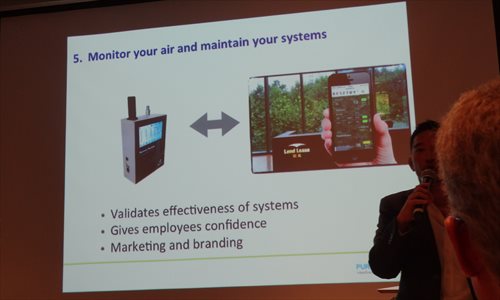HOME >> METRO SHANGHAI
Staying indoors is not a solution to Shanghai’s air pollution
By Yang Lan Source:Global Times Published: 2016-2-28 18:58:01
Apart from a few pristine summer days last year when PM2.5 levels in Shanghai fell below 25, our city's air quality tends not to be very breathable. This past winter, for example, saw frequent AQI (Air Quality Index) levels hitting over 300 along with multiple Orange Alerts advising residents to immediately cease all outdoor activities and stay inside.
But is indoor air quality really that much better than outside? Is just closing the windows enough to protect ourselves from toxic air? According to Shanghai-based environmentalists, the answer is a resounding no.
A recent AQI white paper issued jointly by Jones Lang LaSalle and PureLiving China revealed that the average indoor PM2.5 levels for Shanghai in 2015 from January to October was 87 micro-grams per cubic meter, compared with Beijing's 115.
"For China, particulate matter (PM) is very often worse inside than outside," said Raefer Wallis, founder and CEO of Global Innovations Green Algorithms (GIGA), a China-based nonprofit environmental research organization.
"About 90 percent of buildings in Beijing that we have monitored show little to no reduction of PM2.5. And about 10 percent of the buildings, including several five-star hotels, have worse PM2.5 inside than outside," said Wallis.
But according to Louie Cheng, founder and president of PureLiving China, PM2.5 is not the only pollutant. Major indoor pollutants include volatile organic compounds (VOC) and microbial organisms.
"Which is worse, the air quality indoor or outdoor?" asks Cheng, who previously worked for over 20 years as a chemical warfare engineer with the US Army. "It is like asking someone if they would rather have diabetes or cancer."
CO2 levels neglected
Wallis started monitoring China's indoor air quality in 2005 after importing an electric air quality monitor from the US. When he turned it on in Shanghai, he thought the unit was broken, as the numbers surged directly to the peak limit.
But throughout Wallis' work with GIGA, he says that too much focus is placed on PM2.5 levels while completely ignoring other important parameters such as carbon dioxide (CO2), which indicates if there is a lack of proper ventilation as well as the existence of other indoor pollutants.
"Schools are the classic places where PM2.5 levels are low but their CO2 levels can be 10 times above what they should be. PM2.5 and CO2 tests should never be separated," said Wallis.
"In the office and at home, the three things that you want to test for are PM, CO2 and VOC. But the government test only tests for VOC, formaldehyde, benzene, ammonia, and radon. There is no CO2 or PM test required, because the test is focused on new construction," said Cheng.
According to Cheng, the best way to improve indoor air quality is not by opening the window, which just lets in particulate matter, but rather by filtering in fresh air. "For people who buy new apartments, they should ask the developer if they have filtered fresh air and what level of filtration they have," said Cheng. "If they live in old buildings, there are other ways. They can install some purifiers that have new air coming inside. The third way is to open the window only a few times a day, for 20 minutes or so, then close the windows and turn on an air purifier."
Cheng says that the percentage of local people who had an awareness of monitoring air quality was only 10 percent six years ago. But this awareness has risen to about 50 percent in recent years as China's AQI levels have been made public and reported on by the local and international media. Cheng has also seen a rising number of residents wearing face masks outside, which means that people are transforming their awareness into action.
"In China, all change comes from the grass roots. It does not come because of government policies or because businesses want to do the right thing. It happens only because people at the lowest level put pressure on their managers, the manager tells their boss, and so on. That causes change," said Cheng.



Newspaper headline: Every breath you take
But is indoor air quality really that much better than outside? Is just closing the windows enough to protect ourselves from toxic air? According to Shanghai-based environmentalists, the answer is a resounding no.
A recent AQI white paper issued jointly by Jones Lang LaSalle and PureLiving China revealed that the average indoor PM2.5 levels for Shanghai in 2015 from January to October was 87 micro-grams per cubic meter, compared with Beijing's 115.
"For China, particulate matter (PM) is very often worse inside than outside," said Raefer Wallis, founder and CEO of Global Innovations Green Algorithms (GIGA), a China-based nonprofit environmental research organization.
"About 90 percent of buildings in Beijing that we have monitored show little to no reduction of PM2.5. And about 10 percent of the buildings, including several five-star hotels, have worse PM2.5 inside than outside," said Wallis.
But according to Louie Cheng, founder and president of PureLiving China, PM2.5 is not the only pollutant. Major indoor pollutants include volatile organic compounds (VOC) and microbial organisms.
"Which is worse, the air quality indoor or outdoor?" asks Cheng, who previously worked for over 20 years as a chemical warfare engineer with the US Army. "It is like asking someone if they would rather have diabetes or cancer."
CO2 levels neglected
Wallis started monitoring China's indoor air quality in 2005 after importing an electric air quality monitor from the US. When he turned it on in Shanghai, he thought the unit was broken, as the numbers surged directly to the peak limit.
But throughout Wallis' work with GIGA, he says that too much focus is placed on PM2.5 levels while completely ignoring other important parameters such as carbon dioxide (CO2), which indicates if there is a lack of proper ventilation as well as the existence of other indoor pollutants.
"Schools are the classic places where PM2.5 levels are low but their CO2 levels can be 10 times above what they should be. PM2.5 and CO2 tests should never be separated," said Wallis.
"In the office and at home, the three things that you want to test for are PM, CO2 and VOC. But the government test only tests for VOC, formaldehyde, benzene, ammonia, and radon. There is no CO2 or PM test required, because the test is focused on new construction," said Cheng.
According to Cheng, the best way to improve indoor air quality is not by opening the window, which just lets in particulate matter, but rather by filtering in fresh air. "For people who buy new apartments, they should ask the developer if they have filtered fresh air and what level of filtration they have," said Cheng. "If they live in old buildings, there are other ways. They can install some purifiers that have new air coming inside. The third way is to open the window only a few times a day, for 20 minutes or so, then close the windows and turn on an air purifier."
Cheng says that the percentage of local people who had an awareness of monitoring air quality was only 10 percent six years ago. But this awareness has risen to about 50 percent in recent years as China's AQI levels have been made public and reported on by the local and international media. Cheng has also seen a rising number of residents wearing face masks outside, which means that people are transforming their awareness into action.
"In China, all change comes from the grass roots. It does not come because of government policies or because businesses want to do the right thing. It happens only because people at the lowest level put pressure on their managers, the manager tells their boss, and so on. That causes change," said Cheng.

An air monitoring device for the office is shown during a presentation by Louie Cheng.

Raefer Wallis (second from right) and other speakers at a seminar in Shanghai about indoor air quality

Louie Cheng
Photos: Yang Lan/GT
Newspaper headline: Every breath you take
Posted in: Metro Shanghai